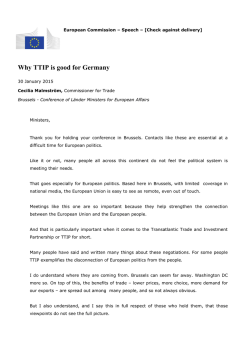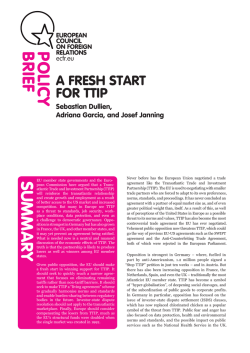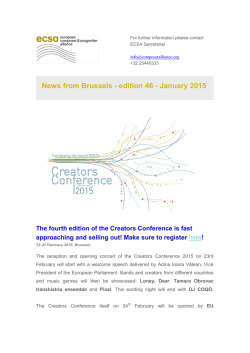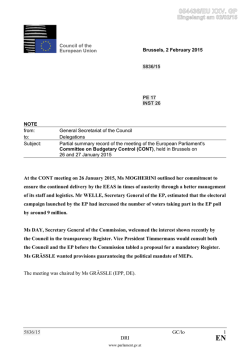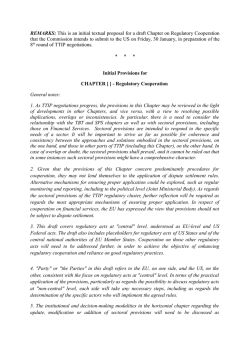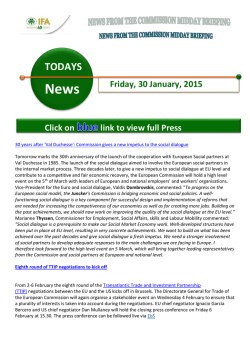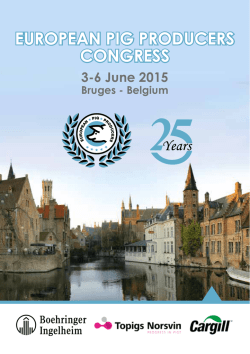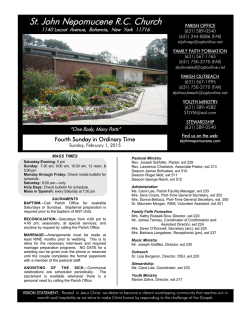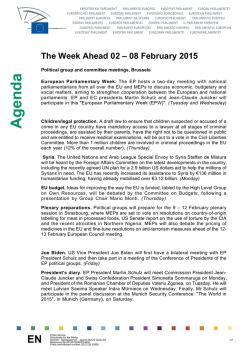
054433/EU XXV. GP
054433/EU XXV. GP Eingelangt am 02/02/15 Council of the European Union Brussels, 2 February 2015 5837/15 PE 18 BUDGET 3 CHINE 6 COMER 23 RELEX 84 NOTE from: to: Subject: x General Secretariat of the Council Delegations Partial summary of the meeting of the European Parliament Committee on International Trade (INTA) held in Brussels on 20 and 21 January – Items 7 to 18 on and 21 the agenda Chair: Mr Lange (S&D, DE) 0V.$/1,ƻ$-LUKAŠEVICA, Latvia's Parliamentary State Secretary for EU affairs, presented the priorities of the Presidency to INTA. She pledged to support ongoing work on multilateral and bilateral trade agreements and to advance ongoing legislative work in the Council. x INTA also exchanged views with the Commission on the outcome of the public consultation on ISDS, with S&D, Greens/EFA, GUE/NGL and EFDD calling for it to be scrapped from TTIP and CETA, and the EPP and the ECR preferring instead to improve it. x It approved by a large majority the Commission proposal on the 2013 discharge of the EU general budget (European Commission), and on two recast proposals on textile imports and on common rules for imports from third countries. x In addition, it debated the activities of the monitoring groups, considered recommendations to the Commission on the TTIP negotiations, and held exchanges of views with representatives of the EU Chamber of Commerce in China and with the Ambassador of Bangladesh on the review of the Bangladesh Sustainability Compact. 5837/15 FFF/mn DRI www.parlament.gv.at 1 EN 7. Presentation by =anGa .aOniƼa-Lukaševica, Parliamentary State Secretary for EU affairs, Ministry of Foreign Affairs, representing the President-in-Office of the Council, on the priorities of the Latvian Presidency in the area of International Trade Policy 0V .$/1Iƻ$-LUKAŠEVICA gave the presentation in the annex in which she described the key priorities of the Latvian Presidency. She gave a commitment to support ongoing work on multilateral and bilateral trade agreements and to advance ongoing legislative work in the Council. During the exchange of views, several MEPs, including Mr MARTIN (S&D, UK), asked if the release of certain Transatlantic Trade and Investment Partnership (TTIP) negotiating documents, including the negotiating mandate, should not become a model for other ongoing negotiations. Similarly, Ms SAÏFI (EPP, FR) asked if the Presidency would be in favour of publishing the negotiating mandate for the Trade in Services Agreement (TiSA). Ms McCLARKIN (ECR, UK) called for the myths surrounding TTIP to be dispelled and for negotiations to move forward, while Mr JADOT (Greens/EFA, FR) underlined the desire of civil society to be more involved in negotiations. Based on the results of a recent US university study, he, together with Ms ARENA (S&D, BE), disputed forecasts on the positive effects TTIP would have on the EU economy. Mr SCHOLZ (GUE/NGL, DE) asked if the Council would consider the results of the Commission’s consultation on Investor-State Dispute Settlement (ISDS) in TTIP, and Ms BEGHIN (EFDD, IT) called for the removal altogether of the investment chapter in TTIP, stressing that citizens did not want to trade national and EU sovereignty for trade agreements. Likewise, Mr MARTIN proposed to vote for the Singapore Goods and Services Agreement as a standalone package (without the investment package) in order to get mass support in the EP, while Mr CASPARY (EPP, DE) criticized the Council’s intention to consider it a “mixed” agreement. MEPs also asked if there was any scope for reopening the investor chapter in the Comprehensive Economic Trade Agreement (CETA). On other issues, Ms ARENA called for a binding regulation on conflict minerals applicable to all operators, while Ms KIRTON-DARLING (S&D, UK) expressed concern about the lack of sustainable development principles in the recently agreed Economic Partnership Agreements (EPAs) with African regions. Mr CASPARY asked if it would be possible to move forward with the Trade in Defence Instruments (TDI) and International Procurement Instrument (IPI) legislative files. 5837/15 FFF/mn DRI www.parlament.gv.at 2 EN Ms KALNIƻA-LUKAŠEVICA again agreed with the need for more transparency and communication with citizens based on facts. While she was fully aware of the sensitivity of ISDS in TTIP, she noted that it should not take centre stage, claiming that negotiating additional market access in goods and services, as well as regulatory cooperation and rules, among other things, should be the focus of the discussions in order to move forward. Moreover, she was confident that TTIP would be beneficial for the EU economy in terms of jobs and growth based on the results of several US and EU studies, including those of the EP and the Commission. 8. State of play of ongoing trilogue negotiations x INTA/8/02083 x Exchange of views Mr LANGE (S&D, DE) announced that after the second trilogue on external trade statistics, COREPER had not yet reached a satisfactory conclusion due to the existence of a blocking majority. Consequently he expressed hesitancy about a speedy outcome. 9. Imports of textile products from certain third countries not covered by bilateral agreements, protocols or other arrangements, or by other specific Union import rules (recast) INTA/8/00575 2014/0177(COD) Rapporteur responsible: Jarosáaw Leszek WaáĊsa (PPE) x Consideration of amendments Mr WAàĉSA (EPP, PL) said that 1 amendments had been tabled, mostly designed to clarify the proposal, to ensure legal clarity and consistency, and to correct technical errors that had been detected by the Council during examination of the proposal. He underlined the favourable opinion issued by the Economic and Social Committee and the convergence between the European Parliament and the Council, and anticipated a first reading agreement. He received the support of S&D, ECR and the Commission. 5837/15 FFF/mn DRI www.parlament.gv.at 3 EN 10. Recommendations to the European Commission on the negotiations for the Transatlantic Trade and Investment Partnership (TTIP) INTA/8/01962 2014/2228(INI) Rapporteur: Bernd Lange (S&D) x Consideration of working document Mr LANGE (S&D, DE) referred to the need to focus on the state of play of negotiations, and to Rule 108 of the Rules of Procedure of the European Parliament (EP), which enabled the EP to carry out an interim assessment of the negotiations. He welcomed the publication of the negotiating mandate but also wanted the release of the basic negotiating documents. The resolution would be divided into two parts: a preamble to establish the need for a trade agreement, and the main body devoted to the different elements of the agreement. He stressed the need to set out the EU’s expectations clearly, and favoured a zero-rate agreement beneficial to citizens on both sides of the Atlantic, with common standards as well as a level playing field for domestic and foreign investors. He downplayed the need for an Investor-State Dispute Settlement (ISDS) mechanism and for special arbitration bodies in the Transatlantic Trade and Investment Partnership (TTIP), and called on the US to be more engaged in the negotiations and to quickly establish a Trade Promotion Authority. He aimed to have the resolution voted during the May plenary. MEPs supported a resolution which would set out the EP’s views and expectations. Their interventions also focused on ways to improve the draft text and reflected the current positions of political groups on TTIP and ISDS. Ms QUISTHOUDT-ROWOHL (EPP, DE) and Ms McCLARKIN (ECR, UK) believed the resolution should send a positive message and highlight the benefits of the agreement instead of just listing unwanted items. Ms SCHAAKE (ALDE, NL) defended an unbiased approach which would reflect the opinions of both proponents and detractors of TTIP, while Mr TREMOSA i BALCELLS (ALDE, ES) and Ms JONGERIUS (S&D, NL) preferred to focus on clear facts and figures. Mr MARTIN (S&D, UK) viewed the resolution as a way to send a message to the various stakeholders, including the US. The Commission said that the next few months would be important in order to assess the US commitment towards TTIP. It encouraged the EP to adopt a clear position on TTIP but warned against a downward spiral between the EP and the US Congress. 5837/15 FFF/mn DRI www.parlament.gv.at 4 EN It reiterated its commitment to safeguarding adequate protection levels and high regulatory standards, and confirmed it would soon publish all the documents on regulatory issues. 11. European Energy Security Strategy INTA/8/01753 2014/2153(INI) Rapporteur for the opinion: Helmut Scholz (GUE/NGL) x Exchange of views Mr SCHOLZ (GUE/NGL, DE) mentioned the rapid transformations in the energy sector and the increasing feeling of insecurity in the energy industry; he viewed international cooperation and the mutual recognition of expertise as vitally important. He also underscored the existing high levels of energy poverty and poor access to energy in some parts of the world, the lack of any reference to an energy partnership and to energy poverty in the Commission's proposal, and the need for the EU to enhance its energy autonomy. MEPs underlined the importance of energy security for the EU (Mr SZEJNFELD - EPP, PL) including as a vital aspect of EU trade policy (Mr LANGE -S&D, DE). They stressed the need to secure a constant supply of energy across the EU, to reduce current energy exposure including overreliance on fossil fuels, to address the fall in oil prices, and to ensure more legal certainty and predictability on the international energy market (Mr ZAHRADIL - ECR, CZ). They proposed diversifying EU energy sources and suppliers, reducing energy consumption (Mr JADOT Greens/EFA, FR - and Mr LANGE), concluding the internal energy market and promoting a broad dialogue with civil society (Mr BORRELLI - EFDD, IT). Ms MOSCA (S&D, IT) noted the absence of any reference to trade policy, while Mr SZEJNFELD announced that he would prepare contributions in the field of climate policy and energy-intensive industries. Mr BUCHNER (GREENS/EFA, DE) felt there should be greater focus on EU expectations of alternative energy sources including renewables, whereas Mr LANGE considered the outcome of the current debate on a Common external energy policy to be insufficient. He underlined the EP’s small margin of manoeuvre in this field, which was reduced to a revision clause of the Common external energy policy due in two of years. The Commission underlined its attempts to develop a broad concept on energy security which could become the reference at international level. It agreed that there was a need to find alternative sources of energy and new partners, and called for a dialogue on EU energy policy. 5837/15 FFF/mn DRI www.parlament.gv.at 5 EN 12. Exchange of views with representatives of the EU Chamber of Commerce in China Mr WUTTKE, President of the EU Chamber of Commerce in China, underlined the volume of trade between China and the EU (EUR 1.5 billion a day) and estimated at EUR 23 billion the hurdles faced by EU businesses in China. He believed that there was room for improvement and referred to the discussions on a Business Investment Agreement (BIA), adding that the new Chinese administration was more reformist and keen to apply the rule of law. Moreover, he did not want to consider any other trade negotiations with China until the conclusion of a BIA and underlined the impact that the Transatlantic Trade and Investment Partnership (TTIP) could have on the BIA, hoping therefore for a quick outcome. He stressed the extremely low rate of penetration of EU financial companies in China and called for a level playing field. He said that EU businesses' endeavours were changing as they were facing more competition, and asked the European Parliament (EP) to report on China’s World Trade Organisation compliance. MEPs intervened: on the need for more legal certainty and for a level playing field in the financial sector; the level of cooperation between EU Member States' national trade representations in China (Mr WINKLER - EPP, RO); on the fight against corruption, the application of the rule of law and EU companies' access to public tenders (Mr LEINEN S&D, DE); on market access, business awareness, intellectual property rights and the counterfeiting of products (Ms MOSCA - EPP, IT); the Shanghai Initiative and granting market economy status to China (Mr BO܇TINARU - S&D, RO); on Business Centres in China and Investor-State Dispute Settlement (ISDS) (Mr FJELLNER EPP, SE); and on security of energy supply and access to raw materials and energy sources (Mr SCHOLZ - GUE/NGL, DE). Mr WUTTKE called for a level playing field in public procurement and for better market access for EU businesses in healthcare, education and logistics. He noted that national representations and European bilateral chambers cooperated well, and praised the good relations between the EU Chamber of Commerce in China and EU delegations. He also thanked the EP for its help in setting up the SME Centre and the Intellectual Property Rights (IPR) Helpdesk. He viewed the BIA as a unique opportunity to foster additional openness in China and did not think the EU’s energy security was at stake because of the Shanghai Initiative. He warned about the implications that dropping ISDS from TTIP could have on negotiations with China, and believed the EU could do more to reengage China on new clean sources of energy and energy saving. 5837/15 FFF/mn DRI www.parlament.gv.at EN Mr WUTTKE said that China did not yet fulfil all the necessary criteria for it to be considered a market economy, but nevertheless drew attention to the latest efforts carried out by the Chinese authorities to improve the independence of the judiciary. 13. Monitoring Groups' Activities INTA/8/01441 x Exchange of views Mr WINKLER (EPP, RO), chair of the monitoring group on Taiwan, noted that the figures for trade between the EU and Taiwan were flat for the last seven-eight years, and that the Taiwanese authorities were keen to engage in trade talks with the EU. The Commission, however, noted that it did not currently have the capacity to engage in trade talks with Taiwan. Mr LANGE (S&D, DE), on behalf of Ms REDING (EPP, LU) chair of the monitoring group on the Trade in Services Agreement (TiSA), announced that the group had discussed the tenth round of negotiations which had not resulted in any significant progress. Mr SILVA PEREIRA (S&D, PT), chair of the monitoring group on Japan, referred to the eighth negotiating round, during which the EU had presented its second list of non-tariff measures to be reduced or eliminated, noting that EU expectations remained positive. Mr BÖGE (EPP, DE), chair of the monitoring group on Central America, referred to the first constitutive meeting in the presence of the Guatemalan Ambassador. He said that volumes in trade and investment were not increasing substantially and that the group would meet soon to discuss the Commission report on the implementation of the agreement. Ms RODRÍGUEZ-PIÑERO FERNÁNDEZ (S&D, ES), chair of the monitoring group on Chile, urged the Commission to prepare a modernisation agenda. Mr LANGE, on behalf of Mr FISAS AYXELÀ (EPP, ES) chair of the monitoring group on Peru and Columbia, stressed the improvement in economic relations between both sides. He said the group had also addressed the issues of human rights and workers' rights, and proposed focusing on implementation of the agreement in that field. He also mentioned a meeting with civil society that had taken place in February 2014, which was considered insufficient. 5837/15 FFF/mn DRI www.parlament.gv.at 7 EN *** Voting time *** 14. Discharge 2013: EU general budget - European Commission INTA/8/01232 2014/2075(DEC) Rapporteur for the opinion: Reimer Böge (PPE) x Adoption of draft opinion The draft opinion was adopted with 30 votes in favour, against and 1 abstention. 15. Imports of textile products from certain third countries not covered by bilateral agreements, protocols or other arrangements, or by other specific Union import rules (recast) INTA/8/00575 2014/0177(COD) Rapporteur responsible: Jarosáaw Leszek WaáĊsa (PPE) x Adoption of draft report The draft report was adopted with 32 in favour, 3 against and 2 abstentions. The Committee voted by a large majority to engage in negotiations with the Council. 16. Common rules for imports from certain third countries (recast) INTA/8/00464 2014/0168(COD) Rapporteur responsible: Jarosáaw Leszek WaáĊsa (PPE) x Adoption of draft report The draft report was adopted with 32 in favour, 3 against and 3 abstentions. *** End of vote *** 17. Exchange of views with the Ambassador of Bangladesh, Ismat Jahan, on the review of the Bangladesh Sustainability Compact "Staying Engaged" Ambassador JAHAN reiterated her government's commitment to address the safety, security and labour issues in the ready–made garments (RMG) sector. She explained that immediately after the tragic incidents in the sector, the authorities had developed a framework to enhance building and fire safety in conjunction with workers' and employers' representatives and with the involvement of the global industry, international brands and development partners. 5837/15 FFF/mn DRI www.parlament.gv.at 8 EN Ambassador JAHAN said that the enhancement of labour conditions and rights had received further impetus with the launch of the Sustainability Compact, and that the EU and the International Labour Organisation (ILO), while acknowledging some progress, had called for further developments. She highlighted some important measures that had been taken in the last two years, which covered a wide range of areas including legal policy reforms, administrative actions, launching of special programmes, assessment of building safety and protection of workers’ rights. They also included the adoption of a tripartite action plan, of the Labour (Amendment) Act of 2013 to improve workers’ rights, and of national occupational safety and health policies, as well as an increase in the minimum wage for garment workers, the launch of a publicly accessible data base on factories, the recruitment of additional inspectors, the development of a common operating manual for assessing building, electrical and fire safety, and the registration of more than two hundred new trade unions between 2013 and 2014. She underscored the importance of constant monitoring, pointing out that after inspections most factories had initiated remediation work in accordance with the recommendations of the assessing authorities. She mentioned the joint initiative with the ILO to develop alternative dispute resolution procedures for addressing complaints about unfair labour practices, and announced that the government was also planning to launch a national social security strategy. She said that Bangladesh greatly valued the EU's support in its overall pursuit of development and that the EU had become Bangladesh's main export market, accounting for 5 per cent of total exports. She noted that continued growth of the RMG industry was important to empower women and eradicate poverty, and that the EU, together with brands and retailers, should reflect on to how best to ensure fair pricing of products to permit the sustainable development of the RMG industry. Finally, she mentioned the growing consensus for brands to contribute financially to the reform process in the RMG sector. Mr LANGE (S&D, DE) asked what Bangladesh's reactions were to the ILO recommendations on its labour law and if it also covered the export processing zones (EPZs). Mr KARIM (ECR, UK), standing rapporteur for the monitoring group on Bangladesh, enquired about the distribution of compensation and asked if EU companies had assumed their responsibilities. Ms KELLER (Greens/EFA, DE) asked how EU support was perceived in Bangladesh, and Mr MARTIN (S&D, UK) asked what had been done to ensure the independence of trade unions. He also enquired about the recruitment and training of inspectors, retailers' commitments and price monitoring. Ms MINEUR (GUE/NGL, NL) enquired about the participation of trade unions and the need to define legal standards to protect workers. 5837/15 FFF/mn DRI www.parlament.gv.at 9 EN Ms ARENA (S&D, BE) asked about corporate responsibilities and mentioned the need to have compulsory due diligence in order to protect workers; she also referred to rumours that some companies had relocated due to the measures that had been taken to protect workers. The Commission announced that it would visit Bangladesh in February on a monitoring mission to assess developments. It shared the view that labour rights at present were improved compared to the situation before the compact. The same was true for the integrity of buildings. However, much remained to be done in a number of areas, such as the implementation of regulations, fair treatment of workers, the dispute settlement clause and inspections of EPZs. AMBASSADOR JAHAN explained that the adoption of the draft implementing rules under the new labour law was now in its final stages and would soon been presented to the tripartite committee. On the 2014 EPZ Labour Act, she said that it had been drafted and approved by the cabinet and would soon be sent to the parliament. She noted that inspection of factories continued and that reports were uploaded into the RMG industry database. She confirmed that the compensation process was still ongoing and should be completed by April 2015. She mentioned several ongoing civil cases examining allegations of unfair labour practices and anti-union discrimination, and assured INTA that the Constitution of Bangladesh contained provisions guaranteeing the independence of trade unions. Lastly, she supported the continuing engagement of European companies/brands and retailers, especially to ensure fair pricing. 18. Presentation by the Commission on the outcome of the public consultation on ISDS Mr DEMARTY, Director-general in DG TRADE said that the consultation had consisted of 13 questions concerning a proposed approach to the Investor-State Dispute Settlement (ISDS) in the Transatlantic Trade Investment Partnership (TTIP): i.e. whether it formed the right balance between the right to legislate and investor protection, and whether further enhancement was possible. The results of the report were factual, did not suggest any policy recommendations and would serve as a basis to develop concrete proposals on ISDS in TTIP. (Commissioner MALMSTRÖM had said that the she would come forward in spring with a proposal on ISDS in relation to TTIP). The Commission had received some 150 000 replies, of which around 97 per cent had been submitted collectively through various online platforms. Around 450 replies from several types of organisation (NGOs, trade unions, business associations and businesses) had been quite detailed. There were two main types of general statement: opposition to/concerns about TTIP in general, and concerns about ISDS in general or about ISDS in TTIP. 5837/15 FFF/mn DRI www.parlament.gv.at 10 EN The replies also showed considerable divergence over most issues. NGOs and trade unions considered that the right to regulate was not sufficiently protected, while businesses cautioned against lowering investor protection. The report identified four areas which required further thought: the protection of the right to regulate in the public interest, how ISDS tribunals would operate in practice and how their functioning would be supervised (there were concerns about the perceived lack of legitimacy of arbitrators to settle such questions, and it would be necessary to look at the way in which arbitrators are appointed), the relationship between domestic judicial systems and ISDS, and the review of ISDS decisions by an appellate mechanism. Mr DEMARTY noted that many citizens lacked sufficient knowledge of ISDS and felt that the concerns of citizens had not been adequately addressed. The consultation also showed concerns expressed through collective submissions about TTIP in general and about the perceived secrecy of TTIP and ISDS, with individual replies claiming that it undermined democratically elected governments. Mr DEMARTY concluded that communication with stakeholders had to be improved and viewed the ongoing transparency process as part of the drive. The Commission had for the first time ever released specific legal proposals during a bilateral negotiation, including position papers, and it would continue to engage with stakeholders to dispel any myths surrounding TTIP. Mr DEMARTY said that broader concerns beyond ISDS were being addressed by Commissioner MALMSTRÖM as part of the "fresh start" and that the EU had to agree internally on the approach to investment protection in TTIP. He reiterated the Commission’s pledge for a TTIP which would be good for citizens, jobs and growth, and that would safeguard EU standards and uphold the EU’s influence in the world. MEPs were divided over the results of the consultation and over ISDS itself. Some, like Mr FJELLNER (EPP, SE) and Ms McCLARKIN (ECR, UK), questioned the results, since many of the participants were not familiar with ISDS, nor had they any experience of it. Ms McCLARKIN said that people unfamiliar with ISDS could not provide an informed response or contribute to an informative debate, while Mr FJELLNER noted that very few academics and lawyers had taken part in the consultation. Mr CICU (EPP, IT) said that the consultation had received responses from only 3 countries (UK, Austria and Germany) and that many of the responses were identical. Mr SCHOLZ (GUE/NGL, DE), on the other hand, referred to the high percentage of negative responses. Mr MARTIN (S&D, UK) and Mr JADOT (Greens/EFA, FR) dismissed Mr FJELLNER’s remarks that few qualified people had taken part in the consultation and that their replies should not be considered. 5837/15 FFF/mn DRI www.parlament.gv.at 11 EN Ms BEGHIN (EFDD, IT) asked the Commission to respect the results of the consultation and the opinion of citizens. She felt that the Commission was ignoring the outcome of the consultation and was trying to find justifications to obtain the desired result at any cost, and she therefore proposed scrapping ISDS. Mr MARTIN also expressed his dissatisfaction with the way the Commission had reacted to the outcome of the consultation, saying that it would send a very bad message to citizens. He noted that the ISDS system was a mechanism that gave disproportionate rights to multinationals against the public authorities’ right to regulate in the public interest, as well as greater rights to foreign investors than to domestic ones. He said that these were the two principles that most people objected to and that so far the Commission was merely attempting to repackage and reword the current proposal in order to overcome some of the fundamental flaws in the ISDS mechanism. Like Ms BEGHIN, he also called for ISDS to be removed from TTIP and CETA, as did Mr SCHOLZ, who called into question a system created in the 190s and that he considered outdated and inadequate to meet today's challenges. Mr CICU thought that the rejection of ISDS could damage several ongoing trade negotiations, and put at risk potential new ones. He preferred instead to improve the current mechanism and referred to the rules for appointing arbitrators, whom he believed should be impartial. He was also in favour of the possibility of appealing an arbitration decision. Ms SAÏFI (EPP, FR) said that in order to have ISDS in TTIP, various requirements would need to be met. ISDS should not prejudge the right to regulate in the public interest on the part of individual countries. Mr DEMARTY noted that protection of investment was within the remit of the EU and that there were more than 1 400 bilateral treaties in all EU Member States, of which 1 300 contained ISDS mechanisms. He said that those treaties had been ratified by national parliaments and governments without any debate. He raised the question of what would happen to the 1 300 existing bilateral treaties if a decision was made to remove ISDS. He explained that ISDS was necessary because international treaties could not be directly applied through domestic laws and because some domestic systems favoured discrimination. He did not think it would be possible to reject ISDS solely in the context of TTIP yet keep it in agreements with the rest of the world. Moreover, he said that removing ISDS from TTIP could have a serious impact on other parts of the agreement, such as public procurement. Mr DEMARTY noted that the online consultation was not a referendum and that the EP would have the last word on the TTIP agreement. 5837/15 FFF/mn DRI www.parlament.gv.at 12 EN Mr LANGE considered investment protection to be the main issue at stake. He asked if ISDS was the right instrument for this. 21. Date of next meeting The next meeting will be held in Brussels on 23 and 24 February 2015. ________________ 5837/15 FFF/mn DRI www.parlament.gv.at 13 EN ANNEX Speech by the Latvian Parliamentary State Secretary for EU representing the President-inOffice of the Council: 0V=DQGD.DOQLƼD- Lukaševica Dear Mr Lange, Honourable Members of the Committee, It is a pleasure to be here, to present our Presidency priorities and to discuss in more detail the important issues related to this Committee’s area of responsibility. Before presenting our priorities, allow me to thank the Italian Presidency and the European Parliament, for ensuring a smooth transition at the start of the new institutional cycle. We therefore believe we must use this opportunity to energise the Union’s work and to deliver results for European citizens. Now, turning to our Presidency priorities, it is important to stress that the EU already has clear objectives. These are laid out in the Strategic Agenda, the Trio Presidency Programme and President Juncker’s Political Guidelines, which were welcomed by the Parliament. Rather than add to the list, we want to take clear action to implement it. We have therefore set out three clear priorities for our Presidency. They are competitive, digital and engaged Europe. Open and fair external trade can help us be both more competitive and more engaged. It is a key instrument when it comes to stimulating economic growth and employment, and to fostering the EU’s strategic international relationships. Open markets, as well as increased trade and investment flows, are essential for promoting growth, supporting industry and consumers, and encouraging a full economic recovery across the EU. The Presidency will work towards these objectives by supporting ongoing work on multilateral and bilateral trade agreements and enhancing the legislative work of the Council. 5837/15 ANNEX FFF/mn DRI www.parlament.gv.at 14 EN We want to actively support a strong, rules-based multilateral trading system. This year marks the 20th anniversary of the World Trade Organisation (WTO) and Latvia’s Presidency will work towards achieving further progress on WTO multilateral negotiations. The Bali Package was a milestone achievement for the WTO and we fully welcome the breakthrough agreement between the US and India and following decisions of WTO General Council allowing moving forward with the post-Bali package. In order to strengthen the multilateral trading system, Latvia’s Presidency will provide ongoing support on the Doha Development Agenda (DDA). We will pursue swift implementation of the Trade Facilitation Agreement and other Bali decisions, and promote discussions on post-Bali deliverables. In order to expand the multilateral trading system, we will encourage progress on ongoing WTO accession negotiations with Kazakhstan, Afghanistan, Azerbaijan, Serbia and others, and support preparations for the upcoming WTO Ministerial Conference in 2015. In addition to multilateral negotiations, we will use our Presidency to support the conclusion of the Trade in Services Agreement (TiSA), the Environmental Goods Agreement, and the finalisation of the Ministerial Declaration on Information Technology Agreement (ITA). Turning to bilateral agreements, we consider TTIP and Free Trade Agreement negotiations with Japan and Vietnam to be our top priorities in the area of trade. Our number one trade priority is the Transatlantic Trade and Investment Partnership (TTIP) and we hope to make substantial progress during our Presidency. As you recall, the European Council expressed a strong commitment in its December conclusions to intensify work on TTIP. President Obama has also made a plea to the Congress on granting the TPA (Trade Promotion Authority) for both Trans-Pacific Partnership and TTIP in his State of the Union speech tonight. The political support from both sides of the agreement provides a good momentum for advancing the negotiations. 5837/15 ANNEX FFF/mn DRI www.parlament.gv.at 15 EN An ambitious TTIP could deliver not only €119 billion annual boost to the EU economy but also geopolitical benefits for Europe given the current international context. EU SMEs will have new markets to sell to, and EU consumers will have access to US goods at lower prices. We will also work together with the institutions and Member States to ensure transparency and timely communications, and foster a well-informed public debate. We have already welcomed the European Commission’s move towards greater transparency in the TTIP negotiations and would like to thank Commissioner Malmstrom for her personal involvement in making TTIP texts available to the European public. Initiatives from the Commission provide an important input to improve efforts for better public communication on the elements of the future agreement. In this context it is important to mention that the Council previously agreed to disclose the TTIP mandate which served as a good basis for transparency. We need to better explain to the public and stakeholders the benefits and significance of the agreement. Both the Commission and the Parliament are already doing a lot to provide more information on the benefits and challenges of TTIP. We agree that communication should be tailored to specific situations and concerns in individual Member States, and it is therefore crucial that national governments are also active in their messaging. There is no doubt that Investor- to- State Dispute Settlement (ISDS) is one of the most sensitive issues today in TTIP. We welcome the publication of the results of the public consultation conducted by the Commission and look forward to discussing the outcome early on in our Presidency. The European Parliament will be closely involved in this debate. During our Presidency the Council will begin discussions on reform of investment protection taking into account current concerns on ISDS as well as the need for strong protection of the EU investment worldwide. 5837/15 ANNEX FFF/mn DRI www.parlament.gv.at 1 EN Turning to another important Trans-Atlantic partner – Canada, the Comprehensive Economic and Trade Agreement with Canada is an important deal that can provide new market access opportunities for European businesses – highly needed in the current economic and politic environment. CETA has been agreed and we believe that existing concerns can be resolved during the process of legal scrubbing. There are a number of other trade negotiations where we would like to make progress. A successful bilateral trade and investment negotiation with Japan is among our key priorities. Opening up the Japanese market to European trade and investment will generate considerable gains for the European economy. Conclusion of negotiations with Vietnam would meanwhile send a strong signal of the EU's continued engagement with ASEAN. While each of the agreements is country-specific, it is clear that the agreement with Vietnam would represent a valuable reference point for the negotiations with other ASEAN partners. It is therefore important to achieve an ambitious outcome that sets the standard for the type of agreement Europe is looking for. We will also pay attention to trade opportunities on our borders, including through the Eastern Partnership. The implementation of Deep and Comprehensive Free Trade Agreements (DCFTAs) with Moldova and Georgia is of course already underway. We must ensure that reforms in these countries quickens and that both Moldova and Georgia receive tangible benefits from trade with the EU. Urgent reforms are also required in Ukraine. DCFTA should not be reopened or altered as a result of pressure from third parties. It should instead enter into force on 1 January 201, as planned. In this regard we would like to thank the European Parliament for the decision on an accelerated procedure on the extension of the Autonomous Trade Measures (ATM) for Ukraine and for Moldova. This decision provided the necessary economic and political support to the governments of both countries. 5837/15 ANNEX FFF/mn DRI www.parlament.gv.at 17 EN I would now like to turn to the legislative files. Our presidency will facilitate legislative work to improve efficiency in decision-making and to focus on delivery. First is the legislative proposal to set up a union system for self-certification of responsible importers of minerals from conflict areas. The draft regulation aims at reduction of the financing of armed groups and security forces through mineral proceeds in conflict-affected and high-risk areas, by promoting responsible sourcing practices. The Council is examining this proposal, and has indicated support for the proposed establishment of a voluntary self-certification system for importers of tin, tantalum, tungsten and gold. We will therefore use our Presidency to facilitate technical discussions within the Council on this file. The second priority concerns amendments to the regulation that forbids the trade of certain goods which could be used for the death penalty, torture or other cruel, inhuman or degrading treatment or punishment. During our Presidency we will intensify technical discussions within the Council on the proposed amendments. We aim to secure negotiating mandates on these two legislative dossiers and to enter into negotiations with the EP. We are looking forward to the Parliament's views on these proposals and we will certainly seek an outcome that is agreeable to all parties and stakeholders. With regards to the proposal for the modernisation of trade defence instruments, we acknowledge that Member States are divided on the issue of the lesser duty rule, but we are open to exploring with the Commission possible options for a way forward. Latvia’s Presidency also stands ready to include in the agenda of the Council’s Working Party amendments on the international procurement instrument (“IPI”), when the Commission comes forward with such a proposal. 5837/15 ANNEX FFF/mn DRI www.parlament.gv.at 18 EN Chairman, Honourable members, We believe that the EU’s trade policy agenda can support growth in Europe, create employment and increase household wealth. We trust we can work in partnership with the European Parliament on these ambitions and challenges. I want to say that I look forward to engaging closely with you over the next six months and beyond. Thank you! ________________ 5837/15 ANNEX FFF/mn DRI www.parlament.gv.at 19 EN
© Copyright 2026
